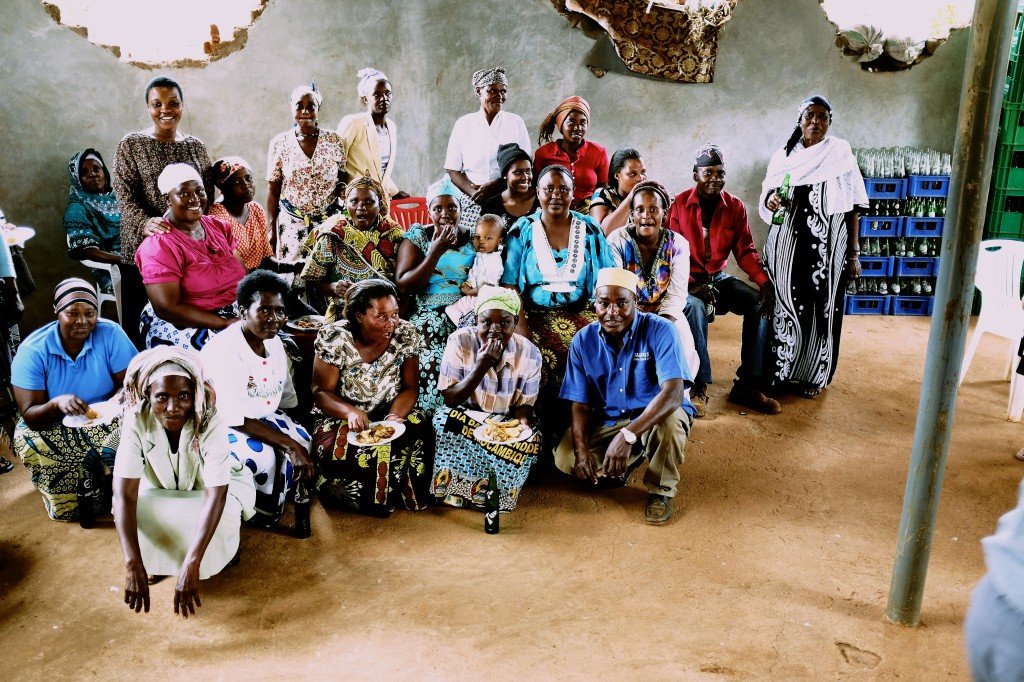
Are Savings Groups the Frontiers of Financial Inclusion?
Every week, a group of residents near the village of Lembeni in Tanzania’s Kilimanjaro region gather in a small hall for a meeting of their savings group. The 30-odd members have, as a group, set aside extra cash for their children’s school, for unexpected emergencies, and to invest in their small businesses.
Their progress is being facilitated and monitored by CARE Tanzania, who received funding through the MicroLead partnership created by The MasterCard Foundation and the United Nations Capital Development Fund (UNCDF) to create new opportunities for expanding financial access to rural communities in Africa.
The setting in Lembeni is simple. Members, sit on plastic chairs organized in a circle, and a few roosters are known to wander into the meetings. This simplicity is deceptive, as group members run through a highly regimented agenda. A small metal box where the group stores its cash is brought forward. The President reads out introductions and presents the core executive team. Three separate group members come forward to open the three locks that secure it. Another group member has been assigned to count the money in the box. A treasurer records all transactions in the group’s ledger, and also announces them out loud so that everyone is aware. The group saves in two separate pools — a social fund to cover emergencies and a loan fund to extend small loans to members, which is administered democratically by the group.
In rural communities like Lembeni, groups like these can serve a powerful function in helping families manage their money. Most people live off small plots of land growing fruits, vegetables and coffee, as well as raising livestock. The dry seasons bring about tough pressures on community members, forcing them to deplete savings they’ve accumulated to pay for food, shelter, seeds and any emergency. In the Kilimanjaro region, the dry season also coincides with the start of the school year, when school fees are due–which brings added stress.
In much of Sub-Saharan Africa, people in rural and remote communities have developed their own solutions so they can save. For hundreds of years, savings groups have existed in rural and remote communities, and through them, millions of people have pooled their money to save for household needs and to insure against emergencies. Despite their near ubiquity in the continent, very little is known about them, beyond a broad understanding of the different types of governing models. It’s only been recently that the NGOs have begun exploring how savings groups could fit in larger developmental priorities around financial inclusion.
Not so long ago, having an account at a bank was only for the wealthy.
As a tool for financial inclusion and community asset management, their appeal is understandable – they are easily accessible and anchored by the trust that people place in their community. Group members in Lembeni, for example, report that their participation in this activity has enabled them to save for their children’s school fees and make modest improvements to their land.
A core component of CARE’s work is to facilitate the linkage of savings groups to formal financial institutions, like community banks, co-operatives, formal banks and microfinance institutions. The assumption is that savings groups would benefit from increased security as well as the ability to earn interest on their savings, establish a credit history, and access other diversified products and services that could enable them to make bigger gains in their economic status. At a practical level, it means that those in charge of holding the cash box can sleep with more peace of mind, knowing they don’t have to physically guard the money they’ve kept on behalf of their fellow group members.
The Lembeni group recently opened its savings account at the nearby Mwanga Community Bank. While this arrangement is relatively new, members reported that this relationship is changing mindsets. Not long ago, having an account at a bank was only for the wealthy. Now, the local bank has become a partner in their shared success — advising them on how to manage their money, trying to understand their needs and develop products and services that help meet these needs.
One such new service is seen in the adoption of mobile banking. Mwanga Community Bank has recently started offering a mobile banking platform that enables people to carry out their transaction from wherever they are. Village-based mobile money agents process the cash-in/cash-out transactions, eliminating the need to incur expenses to travel to a branch. Members say they appreciate the time and money saved in the process – moreover it is a service they can trust. Every single member in this group had a mobile phone, and over two-thirds of them used mobile money.
It’s a relationship Mwanga Community Bank sees a great future in. The bank has tripled the number of clients it serves from just under 10,000 in 2011 to over 30,000 this year, while doubling the value of deposits it holds. Learning from this experience, the bank has started to offer its group products to other pre-existing savings groups in the region. If Mwanga Community Bank continues to grow, there is a potential that it will make more loan capital available to the local economy so that farmers can improve productivity and connect to larger markets.
For the time being, these larger gains are still theoretical. In the meantime, group members speak of a changing mindset. Most had never interacted with a formal bank before, and members report that this relationship represents a profound shift in their understanding of how these institutions work.
Drawing a line between that changing mindset and the more tangible improvements to their living conditions will take time. But the role of savings groups in the larger efforts around financial inclusion — balancing between cost and convenience and combining trust with transparency — will be an interesting space to watch.


